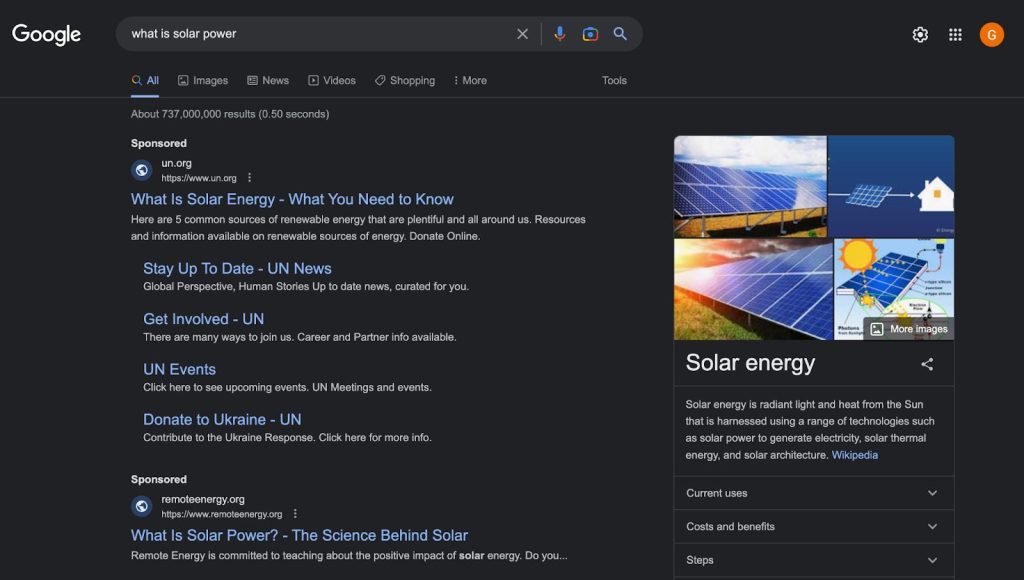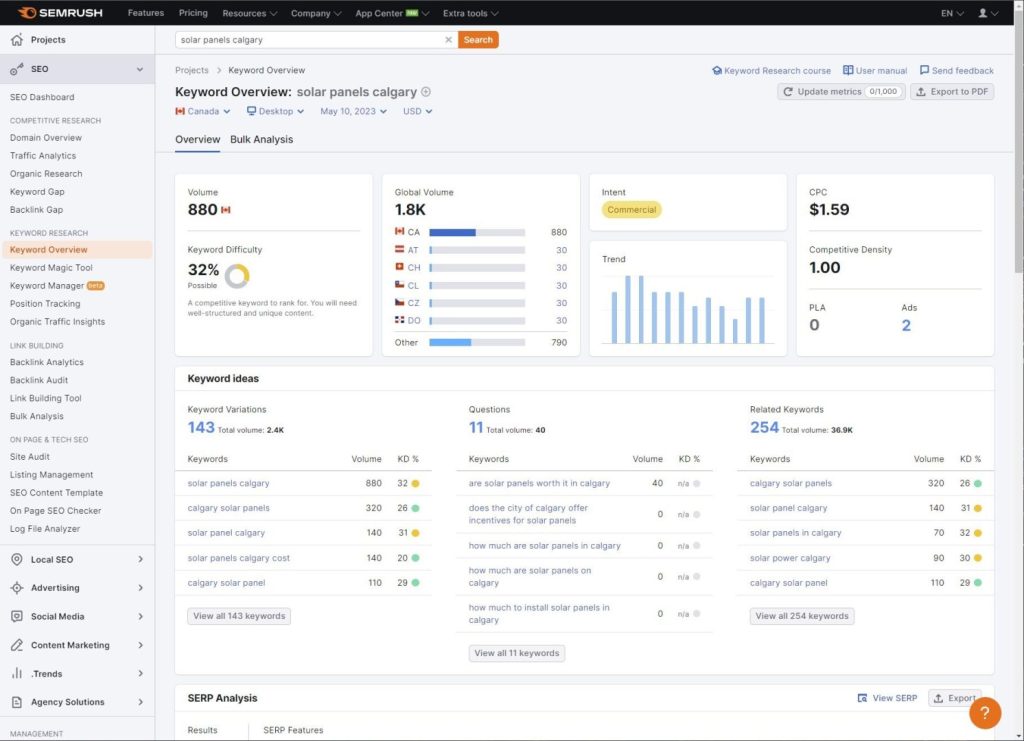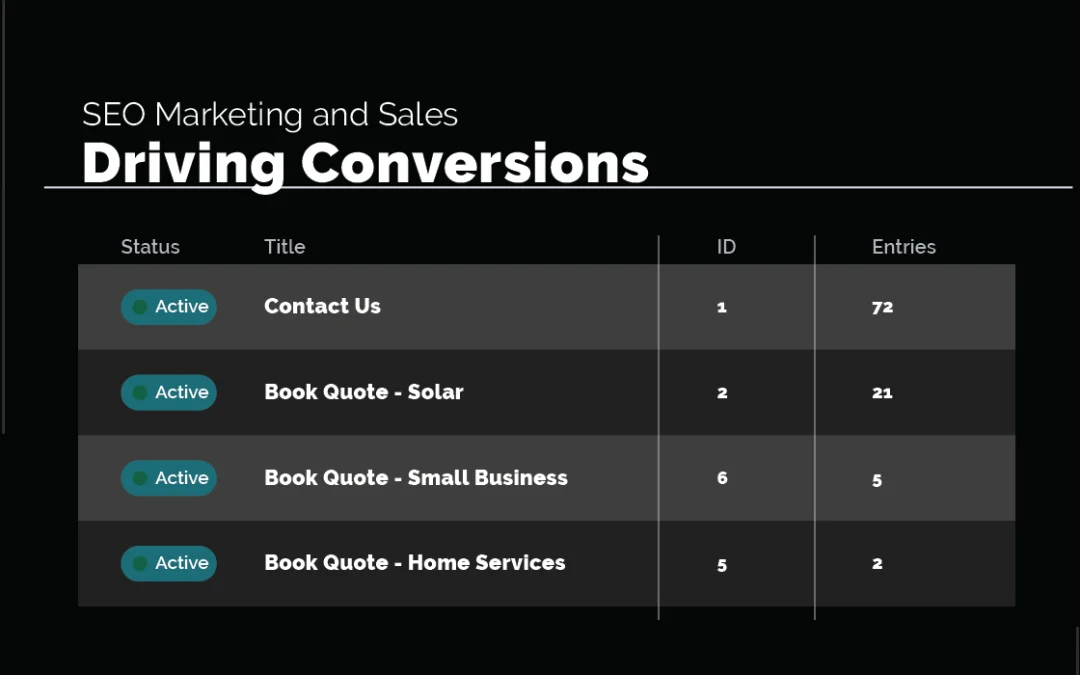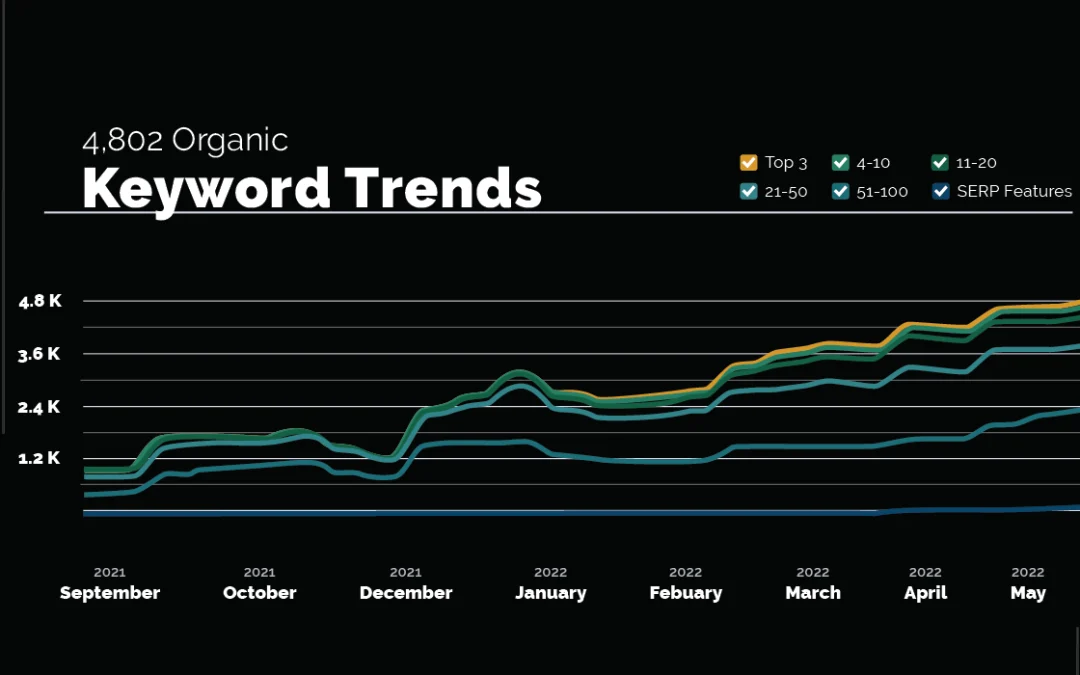Summary
- Solar installers face unique challenges when it comes to reaching potential customers and combating misinformation. SEO (search engine optimization) helps solve these problems by building authority for solar installers and growing their audiences over time.
- SEO improves visibility and credibility for solar installers by making potential customers more likely to find their content. This is particularly valuable because of the misinformation that exists about solar technology online.
- SEO also helps solar installers build an audience that can help them spread messages. This allows them to keep combating misinformation in the future, and gives them a way to direct attention towards new developments or other important causes.
Solar is an exciting industry in a major development phase, but many solar companies struggle to reach potential customers effectively.
That’s because solar installers face unique obstacles, like an epidemic of misinformation about the costs and benefits of their technology. This makes people who are curious about solar technology reluctant to take next steps—and presenting the facts is extra difficult in a world where mainstream science and media are commonly questioned.
Fortunately, SEO provides a way to build long-term branding through thought leadership and help get your message out to the right audience.
SEO is particularly useful for navigating people through the buying process—from awareness to interest to decision making. It can also help you drive secondary traffic to your social media, partner sites, or causes you care about. As a digital marketing company with decades of combined experience specializing in organic marketing and SEO, the Mono team is here to shed light on the benefits this approach offers solar installers.
What Is SEO & How Does It Work?
SEO stands for Search Engine Optimization—the practice of optimizing a website or piece of content to increase its visibility and ranking on search engines. Let’s use Google as an example.
Whenever someone searches for a specific keyword or phrase, Google scans its index—which you can think of as a digital archive of all the content it knows about—to find the most relevant and authoritative results. It then displays these in its search engine results pages (SERPs):

SEO exists to make specific pages more competitive in SERPs, thus ensuring that more people who type in particular keywords or search terms will see and visit them. This involves a range of different techniques, such as:
- Optimizing the page’s content, structure, and code
- Building high-quality backlinks
- Using relevant keywords and metadata
Why Is SEO Important for Solar Energy Businesses?
Every company looking to build its brand consistently over the long term can benefit from SEO. However, the biggest challenge solar installers face is also one that SEO is extremely useful for solving: educating potential buyers so that they feel informed enough to make decisions.
Common Pain Points for Solar Installers
The biggest obstacle you probably face as a solar installer is that people don’t know—or trust—the benefits of what you sell. Over 9 in 10 Canadians agree that green energy can reduce their household’s environmental footprint, but less than 5% currently have rooftop solar panels to generate electricity.
Two factors likely contribute to this reluctance. The first is that trust in mainstream media is declining—trust in the news has dropped 13% since 2016 among Canadians. So even when the benefits of solar energy are touted by major networks, people don’t always believe them.
The second reason is that the internet is full of conflicting messages about solar’s effectiveness. So when people who don’t trust the news look for information online, they’re likely to become even more doubtful—regardless of whether the information they find comes from a source with a vested interest in preventing people from using solar technology.
That brings us to the first major benefit of using SEO as a solar installer: it helps you get your message out in front of the naysayers.
Now, let’s take a closer look at how to create effective messaging and use SEO to spread it.

What Do Potential Solar Customers Need to Know?
As a solar installer, your potential customers need to be aware of:
- The environmental benefits of adopting solar technology
- How much electricity they could save each year by installing solar panels on their roofs
- How long it would take for the savings to offset the costs of installing their solar panels
- Their available financing options (including grants, interest free loans, or rebate programs)
- How solar panels can protect them against future increases to their electricity rates
- How solar panels can improve the resale value of their homes
When you have an effective SEO strategy, this is the information your potential customers see first when they search for things like “are solar panels a good investment” or “should I buy solar panels”—instead of, say, an article sponsored by an electrical provider who wants to keep people dependent on their services.
Key Benefits of SEO for Solar Installers
- Increased visibility: makes potential customers more likely to find your data about the benefits of solar technology (and less likely to find misleading information)
- Trustworthiness: establishes you as a trustworthy voice within the solar space, giving you credibility
- Brand-building: helps you build an audience over time so you have a platform you can keep using to addressing misconceptions or concerns about the industry or direct attention towards other causes you care about
- Long-term growth: high-quality SEO content can drive traffic to your site for years after it’s published, which means your growth can snowball if you keep producing it.

Key SEO Techniques for Solar Energy Installers
SEO isn’t rocket science, but it involves a lot of different tasks. Here are some techniques you can use to improve SEO for your website and other types of content (like blogs or infographics):
For Websites
- Keyword research: use keywords and phrases related to your business and target audience in your website’s content, metadata, and URLs. You can use tools like Semrush or Google Search Console to help with your keyword research.
- On-page optimization: give your website a clear and organized structure to improve user experience (UX), along with relevant and high-quality content. You’ll also want to make sure it has a strong internal linking structure so your different pieces of content help drive traffic to each other.
- Technical optimization: top out your site’s page speed, make it mobile-friendly, and check your robots.txt file to make sure the pages you want search engines to crawl aren’t blocked by accident.
- Building backlinks: create high-quality backlinks to your website on other authoritative websites in your niche, as these can significantly boost your site’s ranking.
- Social media integration: social signals can also influence your website’s search engine ranking. Create widgets for your social media accounts on your website to increase its visibility and reach.
- Local SEO: search engines display different results to people based on where they’re searching from, so you’ll want to include local keywords to reach customers near you. You should also create a Google My Business listing and try to obtain backlinks from other local businesses or organizations.
For Content
- Keyword research: just like on your website (see above), you’ll want to identify and use keywords your audience is likely to search for in any content you publish.
- Provide value to users: your content needs to be high-quality, engaging, and relevant to your audience’s interests.
- Heading structures: use headings to break up your content into digestible sections and make it more parsable for visitors (Google looks at your headings like chapters in a book to determine how clearly your information is presented when ranking your content).
- Use multimedia: images, videos, and other assets increase user engagement with your content. Make sure these assets have relevant keywords in their file names, alt tags, and other metadata.
- Social sharing: sharing your content on social media platforms increases its reach and engagement—which can also help boost your content’s search engine visibility.
- Monitor and update: regularly analyze the performance of your content with tools like Google Analytics and adjust your strategy as needed. This also involves updating existing content to make sure it stays relevant as new developments in the solar industry occur (like price changes, incentive programs, or new technologies).
Common SEO Mistakes for Solar Installers to Avoid
Using the tips above can help your site and content rank higher on SERPs, but there are also some errors that can cause your search engine rankings to suffer. Here are a few things to steer clear of if you want your content to perform at its best:
- Keyword stuffing: overusing keywords in your content or metadata gets it penalized by search engines. Make sure the keywords fit into your content naturally.
- Not optimizing for mobile: more people browse on mobile devices than laptops or desktops, so you’ll get deranked if your mobile site is incomplete or nonexistent.
- Duplicate content: Having identical or similar content on multiple pages can cause them to compete with each other.
- Broken links: links that don’t work negatively impact your website’s user experience and crawlability.
- Ignoring metadata: Not using meta tags (like meta titles and descriptions) or using them improperly can negatively impact your search engine ranking.
- Poor UX: search engines penalize pages with bad user experience (like slow load times, difficult navigation, or low-quality content).
- Poor-quality backlinks: backlinks from low-quality or spammy websites can harm your search engine ranking. Focus on backlinks from relevant and authoritative websites.
Using SEO to Shine a Light on Your Business
Just like a homeowner considering solar panels for their roof, the prospect of launching an SEO campaign can seem daunting to many businesses at first—but the long-term benefits vastly outweigh the initial investment and learning curve. The steps above might seem complicated, but once you learn how to implement them consistently, they’ll provide lasting value to you as a solar installer by setting you up as an authority in an emerging market and making it easier to reach your customers.
For SEO support that can help you get comfortable with the process faster and avoid common pitfalls, contact our team at Monochrome Marketing. We’ll be happy to consult with you about the best way to use SEO to meet your business goals.








